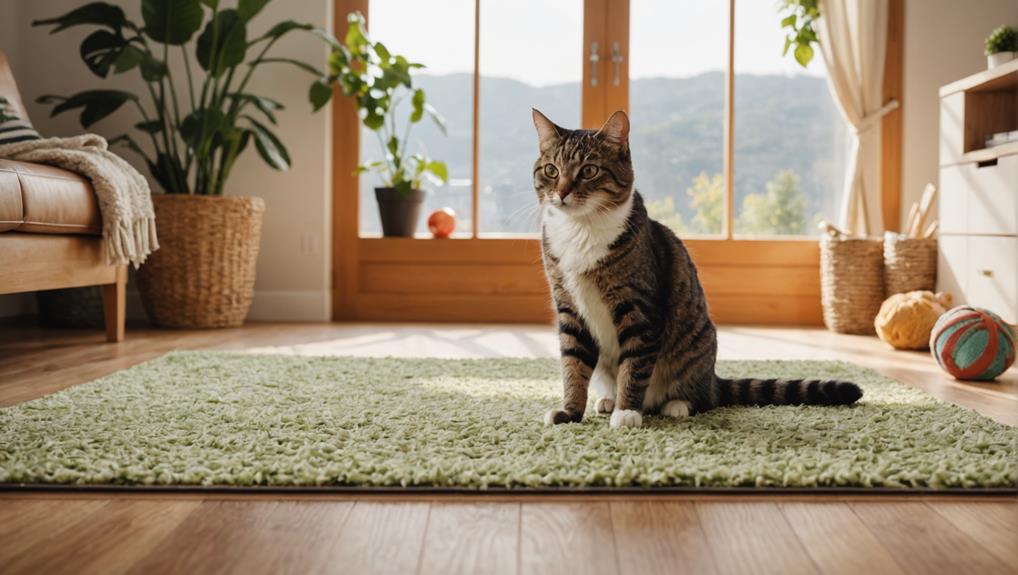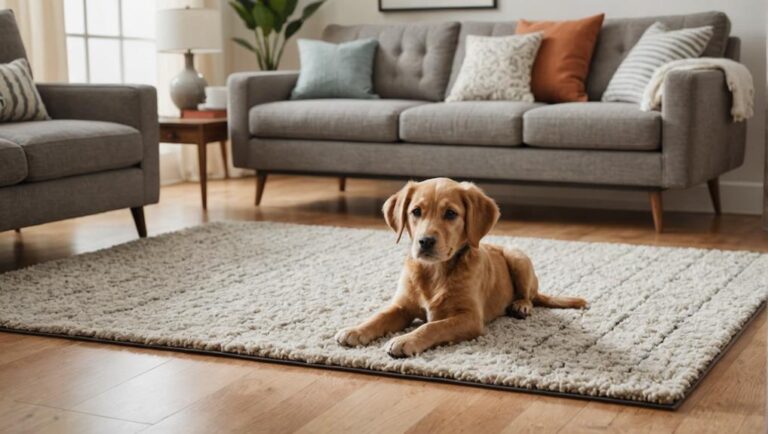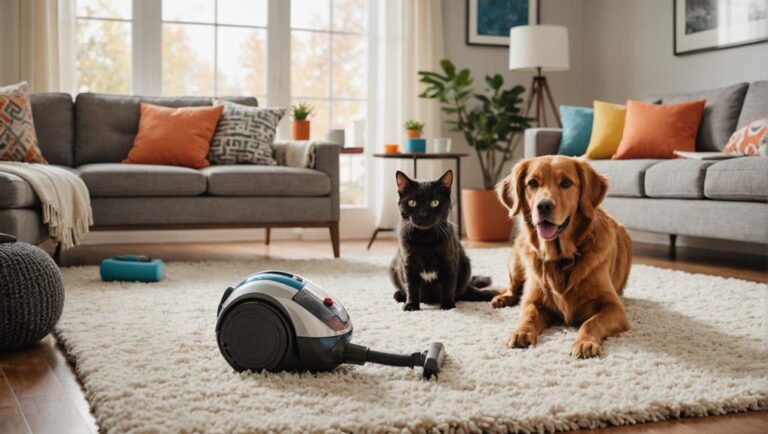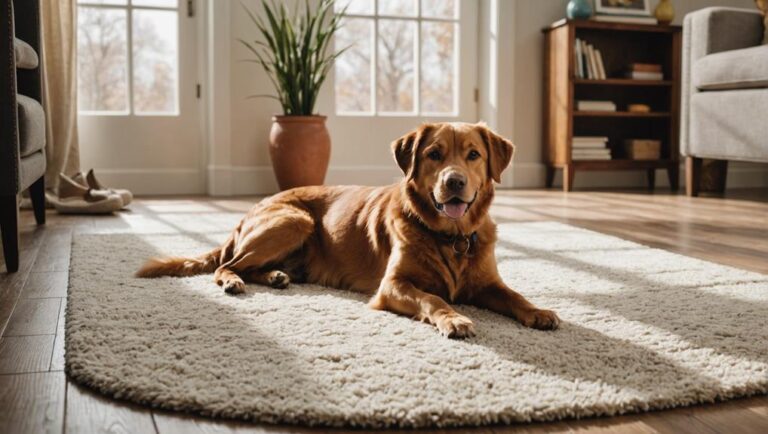When you're choosing scratch-resistant flooring for your cats, it's important to take into account their natural scratching instincts. Options like luxury vinyl and laminate tiles mimic appealing materials while offering durability and resistance to scratches. Vinyl is particularly soft on paws and easy to clean, while laminate provides an affordable, stylish alternative. Be mindful that hardwood looks great but can wear easily. Make certain to maintain the floors by sweeping regularly and using gentle cleaners. This balances both your home's aesthetics and your cat's comfort. There's plenty more to unpack to guarantee you make the best choice for your furry friends.
Understanding Cat Behavior
When it comes to choosing flooring for your home, understanding cat behavior is essential. Cats are naturally inclined to scratch, driven by their scratching instincts. This behavior isn't just a quirk; it's a fundamental part of how they maintain their claws and mark their feline territory. When you select flooring, consider how your furry friend interacts with their environment.
Cats use scratching as a way to communicate and establish boundaries. If your cat feels their territory is threatened, they may scratch more vigorously, leading to potential damage to your flooring. It's important to choose materials that can withstand this instinctive behavior while also providing a safe space for your pet.
Consider the layout of your home and where your cat spends most of their time. They may have favorite spots for lounging or playing, which can influence where they'll decide to scratch. Providing designated scratching posts or pads can help redirect their behavior and minimize damage to your floors.
When selecting flooring, think about options that are both durable and comfortable for your cat. Smooth surfaces may be less enticing for scratching, but textured options can engage their natural instincts. By understanding these behaviors, you'll be better equipped to choose flooring that satisfies both your aesthetic preferences and your cat's needs, ensuring a harmonious living space for both of you. Remember, the goal is to create a safe environment that respects your cat's instincts while protecting your home.
Top Scratch-Resistant Materials
While you want your home to look beautiful, it's equally important to choose flooring that can withstand your cat's scratching habits. When considering scratch-resistant flooring, two materials stand out: vinyl planks and laminate tiles. Both options provide durability and style, ensuring your space remains inviting while handling your feline friend's antics.
Vinyl planks are a fantastic choice for cat owners. They're incredibly resilient against scratches and can mimic the look of hardwood or stone, giving you aesthetic flexibility. Plus, they're water-resistant, which is a significant consideration for maintaining cleanliness and safety in your home. The soft surface of vinyl can also be easier on your cat's paws, making it a comfortable choice.
Laminate tiles are another solid option. They're crafted to look like natural materials but are designed to endure scratches and dents. The protective coating on laminate tiles makes them resistant to wear, ensuring they hold up well against your cat's claws. Additionally, laminate tiles are easy to install and maintain, making your life a bit easier.
When selecting flooring, keep in mind that both vinyl planks and laminate tiles come in various styles and colors, so you won't have to compromise on aesthetics. Ultimately, choosing the right flooring material can help create a safe, beautiful space that works for both you and your beloved cat. Prioritize durability, and enjoy a home that looks great while standing up to your furry companion's playful nature.
Pros and Cons of Flooring Types
Choosing the right flooring for your home can feel overwhelming, especially with so many options available. Each flooring type has its pros and cons, and it's crucial to weigh them carefully, especially when you have cats.
Hardwood flooring is a classic choice, offering stunning flooring aesthetics and warmth. However, it's not the most scratch-resistant option. If you love the look of wood but want something more cat-friendly, consider hardwood alternatives like laminate or vinyl. These materials mimic the beauty of hardwood while providing better resistance to scratches and dents.
On the flip side, while laminate is durable and affordable, it can feel less luxurious compared to genuine wood. Additionally, some lower-quality laminates may not hold up well against heavy scratching. Vinyl, particularly luxury vinyl, is another excellent alternative that combines aesthetics with durability. It's water-resistant, easy to clean, and soft underfoot, making it a safe choice for your feline friends.
Tile is another option that offers excellent scratch resistance; however, it can be cold and hard, which may not be comfortable for your cats. Plus, the grout lines can be challenging to clean.
Ultimately, the right flooring type balances durability and aesthetics while ensuring a comfortable environment for your pets. By considering each option's pros and cons, you can make an informed decision that suits your home and your furry companions.
Maintenance Tips for Longevity
Maintaining your flooring is key to guaranteeing it stands up to the wear and tear of daily life, especially with playful cats around. Regular upkeep not only keeps your floors looking great, but it also prolongs their lifespan. Here are some practical maintenance tips to help you protect your investment:
- Use the right cleaning techniques: Opt for gentle cleaners that won't damage your flooring. Avoid harsh chemicals that could harm your pets.
- Apply protective coatings: Consider using protective coatings that add an extra layer of durability. These can help resist scratches and make cleaning easier.
- Regular sweeping and vacuuming: Keeping loose fur and dirt at bay prevents scratching and maintains your floor's integrity. Guarantee you use a vacuum suitable for hard surfaces.
- Address spills immediately: Quick action can prevent stains and damage. Blot spills with a soft cloth and use appropriate cleaners for your flooring type.
- Rotate furniture placement: Changing the layout can help distribute wear evenly, preventing areas from becoming overly scratched.
Budget-Friendly Flooring Options
When budgeting for flooring that can withstand the antics of your feline friends, it's essential to evaluate options that balance affordability with durability. Fortunately, there are budget-friendly flooring choices that offer both scratch resistance and safety for your home.
Vinyl planks are an excellent option for cat owners. They're not only cost-effective but also highly resistant to scratches and stains. Most vinyl planks come with a protective layer that can handle your cat's playful scratching while being easy to clean. Plus, they're available in a variety of styles and colors, allowing you to find something that matches your home decor without breaking the bank.
Another great choice is laminate tiles. These tiles mimic the look of hardwood or stone but at a fraction of the cost. Laminate is particularly tough against scratches and can withstand the wear and tear that comes with feline activity. Just make sure to choose a high-quality laminate that has a good wear layer for added durability.
Both vinyl planks and laminate tiles are easy to install, making them a DIY-friendly option if you're looking to save on installation costs. While you consider your budget, remember that investing in scratch-resistant flooring not only protects your home but also provides a safe environment for your cats to play.
In the end, you don't have to compromise on style or safety when selecting budget-friendly flooring for your feline family members.
Frequently Asked Questions
How Do I Transition My Cat to New Flooring?
Shifting your cat to new flooring can be a bit tricky, but it's doable! Start by introducing your cat to the new flooring gradually; let them explore at their own pace. Observe their behavior—some cats may feel uneasy at first. You might want to use familiar items like their bed or toys on the new surface. If you choose a more scratch-resistant flooring type, it can help ease concerns about potential damage.
Can Scratch-Resistant Flooring Be Installed Over Existing Flooring?
Imagine stepping onto a new floor that's both stylish and practical. Yes, you can install scratch-resistant flooring over existing flooring in many cases. The installation options depend on the flooring materials you're using. For instance, luxury vinyl or laminate can often be placed over tile or wood. Just guarantee the surface is clean and level to promote safety and durability. Always check manufacturer guidelines to keep your home safe and sound.
What Colors and Patterns Hide Scratches Best?
When picking colors and patterns for flooring, consider those that minimize scratch visibility. Darker shades or multi-toned textures can effectively disguise scratches, while matte finishes tend to show wear less than glossy ones. Textured surfaces also help camouflage imperfections, making them a practical choice for high-traffic areas. Ultimately, choose a look that complements your space while ensuring it's safe and comfortable for everyone, including your furry friends.
Are There Any Specific Brands Known for Cat-Friendly Flooring?
When looking for cat-friendly flooring, consider brands that prioritize cat-safe materials. Options like luxury vinyl and laminate are popular due to their durability and easy flooring maintenance. Brands such as Armstrong and Shaw offer products designed to withstand scratches while being safe for your furry friend. Remember, selecting the right flooring not only enhances your home's aesthetic but also guarantees a safe and comfortable environment for both you and your cat.
How Does Humidity Affect Scratch-Resistant Flooring Durability?
Did you know that high humidity can reduce flooring lifespan by up to 30%? When it comes to scratch-resistant flooring, humidity can negatively impact durability. Excess moisture may cause warping or swelling, making maintenance more challenging. To keep your flooring safe and long-lasting, guarantee proper humidity levels in your home. Regularly monitoring and adjusting humidity can help maintain your flooring's integrity, ultimately providing a safe environment for both you and your pets.




